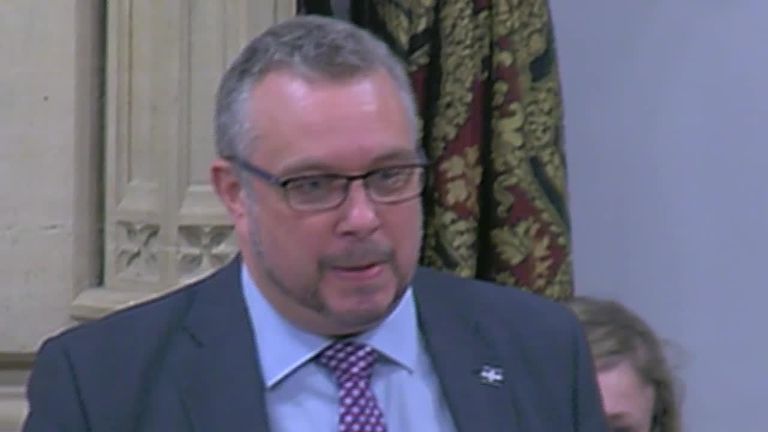'Genie out of the bottle' on televised election debates
Supporters and opponents give their views in a debate, sparked by a Sky News petition that gained more than 140,000 signatures.
Monday 18 March 2019 18:29, UK
The "genie is out of the bottle" and televised debates should become a regular fixture of election campaigns, MPs have heard.
Supporters and opponents of the idea gave their views in a debate at Westminster, sparked by a Sky News petition that has gained more than 140,000 signatures.
The Make Debates Happen campaign - which continues to invite readers and viewers to sign the petition - is calling for an independent commission to be formed to oversee televised election debates between party leaders.
It was approved for a debate in parliament after hitting 100,000 signatures and it opened at Westminster Hall on Monday, where petitions committee member Steve Double said the "nature of politics has changed".
He said: "The growth of the 24-hour news cycle and the development of social media mean that what the public have come to expect of their political leaders has changed.
"We now generally expect our leaders to be much more visible and accessible than they were in previous generations.
"I believe that it is in this context that the matter of holding leaders' debates must find its place."
But responding for the government, elections minister Chloe Smith said an independent commission was not necessary.
She told MPs the current system, which sees debates arranged by political parties and broadcasters, works adequately and delivers "fair and impartial" debates.
"I think we have heard a number of very good arguments on this topic, although I think they mainly focused to my ear, on the way that TV debates are good and helpful in themselves, rather than necessarily legislating for them to be the way forward," Ms Smith said.
Television debates are commonplace in most democracies - but in the UK they have only happened once, in 2010.
Before and since, negotiations over the topic have broken down between party leaders and broadcasters.
The idea of the commission is to take politics out of the discussions, as happens with the Commission on Presidential Debates in the US, where a TV debate has taken place in every election since 1976.
The debate in Westminster Hall represented an important staging post of the campaign.
Speaking in favour of Sky's campaign, Labour MP David Drew said: "From my perspective, the 2010 debate let the genie out of the bottle and, quite simply, it cannot be put back in.
"In both 2015 and 2017, when there was at least a precedent, it was bizarre that the prime minister of the day decided that debates were not appropriate for those particular elections. That is dangerous.
"I think that we give prime ministers far too much power and that there is a need for an independent voice on this issue. Responsibility should not rest with the government of the day, let alone the prime minister."
Peter Bone said an independent commission was needed to take the politics out of it.
"We have to have an independent commission, because the problem is that the party with the advantage does not want to have a TV debate," said the Conservative MP, who is bringing forward a private members' bill on the issue.
Labour MP Graham Stringer said "debate is at the core of democracy and our society" and "we need to have that debate in as many forums as we can".
Among the concerns expressed by sceptical MPs were that debates would "suck the oxygen" out of campaigning and become the focus of elections.
Opponents also said the move would see Britain become similar to the US and shift from a parliamentary system to a more presidential one, with a focus more on personality rather than policy.
Another issue raised was whether smaller parties - like the Liberal Democrats, the Scottish National Party, the Greens and Plaid Cymru - would be given a platform along with the Conservatives and Labour.







